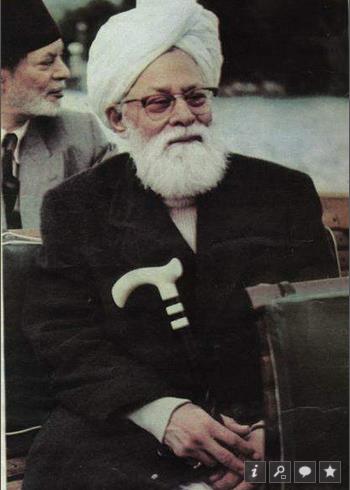In
the 125-year old history of the Jamaat-e-
Ahmadiyya, Hadhrat Mirza Bashir-ud-Din Mahmud Ahmad (ra) (1889-1965) holds a
very special place. If the idea of Khilafat-e-Ahmadiyya
was invented after the death and departure of the Promised Massih Hadhrat Ahmad
(as) (1835-1908) and took its initial contours during the time of the Khilafat of Maulvi Hakkim Nuruddin Sahib
(ra) (1908-1914), it was during the time of Hadhrat Khalifa Sani (ra) that the
institution, in many ways, got consolidated, as the period of his Khilafat extended over half a century. If
today, for devout Ahmadis, the institution of Khilafat-e-Ahmadiyya holds much significance in their lives and the
obedience to the Khalifatul Massih is
perceived by the members as a foundational act of religious sincerity, it has
occurred through the specific interpretations of the teachings of the Promised
Massih (as) and the conscious policy choices adopted especially during the
second Khilafat.
2014
marks the one hundred years of the beginning of the second Khilafat in the
Jamaat-e-Ahmadiyya. As tragic irony goes, the year also marks one hundred years of the
Great Split among the Ahmadis. It was with the death of the first Khalifa
Hakkim Nuruddin Sahib (ra) in March 1914 that the differences of opinion among
the companions on ideological directions of the Jamaat came to the foreground.
The refusal of some of the influential companions of the Promised Massih (as)
to agree upon the leadership of the eldest son of the Promised Massih (as) led
to the Split in the Jamaat and also the formation of the Lahore Ahmadiyya
Movement (LAM) and the Jamaat-e-Ahmadiyya Qadian (JAQ) as two separate
fractions.
Ideological
Implications of the Split
The
formation of the LAM under the leadership of Maulana Muhammad Ali Sahib
witnessed the intellectuals and the opinion makers within the Jamaat moving
along with him, out of Qadian, in the aftermath of the Split. On the contrary,
the substantial mass of common believers took allegiance to Mirza Bashir-ud-Din
Mahmud Ahmad Sahib, who became the second Khalifa of the JAQ at a relatively
young age of 25. Both fractions committed themselves to the propagation of
Islam as “originally” taught by the Promised Massih (as), even as they bitterly
differed among themselves on the ‘true’ conception of those teachings. The
great scholars in both the fractions produced volumes of literature in support
of their sectarian identity, chosen lexicological interpretations of abstract
concepts with nebulous meanings and advanced their respective terminological
preferences such as ‘Nabi’,‘Mujaddid’, ‘Ummati Nabi’, ‘Ummati wa Nabi’,
‘Khalifa’, ‘Amir’ etc.
To
the uninitiated and the ill-informed, the diverging philosophical positions
might appear like highly abstract matters. Yet, the fact is that the fractional
war within the Jamaat-e-Ahmadiyya has had its consequences, desired as well as
unintended fall-outs, both internally and externally. Most crucially, it was the
sectarian divisions within that played into and provided the fuel to the fire
of hatred and jealousy nurtured by the Mullah and the enemy class (often
feeding one another) to undermine and possibly attempt to destroy the Jamaat-e-Ahmadiyya
altogether by declaring it out of the pale of Islam in the murky politics of
Pakistan, in the subsequent decades.
Personal Dimensions of
the Split
Internally,
the hardening of doctrinal positions and ill- thinking of fellow brothers on
both sides of the divide led to intolerance of differences within the
Jamaat-e-Ahmadiyya. Some Ahmadis suspected fellow Ahmadis of ideological drift
and personal ambitions. These tensions in ideological positions and the
personal equations produced, in their wake, a number of allegations by people
who were once closer to one another than their own families and clans and
tribes, based on the affinity of Khilafat-e-Ahmadiyya. Some
of the bitter critics and vocal opponents of the second Khalifa alleged about
practices of social boycott and criminal intimidation in Qadian. Even allegations
of incitement to murder had been made against the Khalifa. The police records
and the court documents of the times speak about these controversies. In their
refusal to recognize the claim of the second Khalifa as to the fulfilment of
the prophecy Musleh Maoud, part of the reason or justification publically given
by his critics in the LAM includes the controversies and cases surrounding his
administration of the Jamaat in Qadian.







